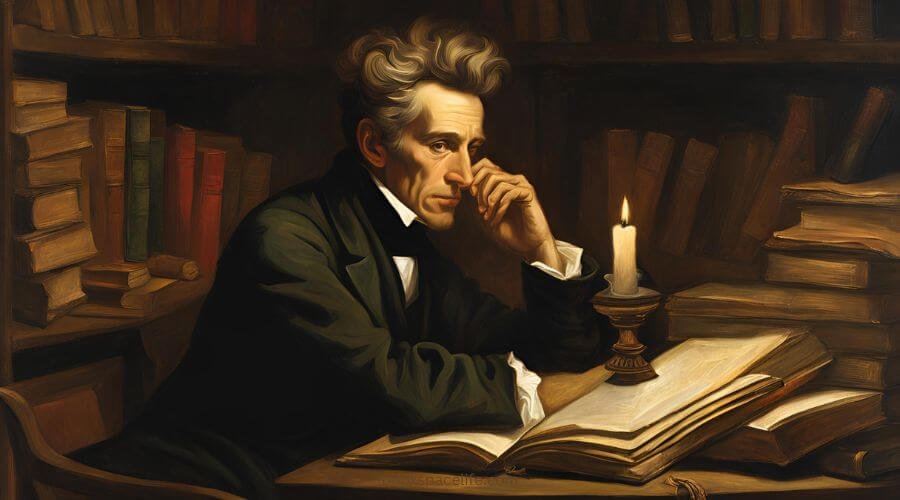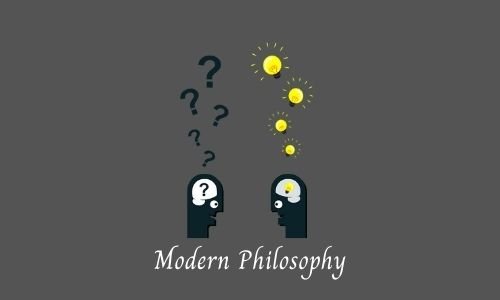Philo of Alexandria
Søren Kierkegaard: The Father of Existentialism
Jonathan Edwards (1703 – 1758 CE) was an American preacher, theologian, philosopher, and missionary who played a pivotal role in the religious revival movements of the 18th century.
Widely considered one of the most influential figures in the development of Christian theology in America, Edwards is best known for his fiery sermons, such as the infamous Sinners in the Hands of an Angry God, and his intellectual contributions to the philosophy of religion.
His unique blend of deep theological insight, intellectual rigor, and spiritual fervor set him apart as a visionary who sought to reconcile reason and faith.
Edwards’ philosophical and theological ideas had a profound impact on both American religious life and broader philosophical discussions in the years following the Great Awakening.
His works laid the foundation for a distinctively American theology that would influence generations of Protestant thinkers and contributed to the emergence of modern evangelicalism.
Though his influence waned in certain circles during his lifetime, his writings have continued to resonate in both Christian theology and the broader landscape of philosophy.
Table of Contents
(1) Early Life and Education
Søren Aabye Kierkegaard was born on May 5, 1813, in Copenhagen, Denmark, into a deeply religious family.
His father, Michael Pedersen Kierkegaard, was a stern, pious man who had suffered much in his life and often reflected on the suffering and sin of humanity.
His mother, Anne Sørensdatter Lund, was a more quiet and reserved woman.
Kierkegaard’s father had a profound influence on his life, particularly with his melancholic religious outlook, which later shaped Søren’s own views on despair, sin, and existential anxiety.
Kierkegaard was raised in an environment that emphasized the importance of faith and piety.
His early life was marked by personal tragedy; his mother died when he was young, and his father, burdened by his own guilt and reflections on divine punishment, spoke often of God’s wrath.
These formative experiences had a lasting impact on Kierkegaard, who came to view life as an arena of suffering, existential angst, and the search for meaning.
Kierkegaard later referred to his father’s influence as a “curse,” yet this same religious upbringing played a significant role in the development of his philosophy.
Kierkegaard was educated at the University of Copenhagen, where he studied theology, philosophy, and the classics.
His intellectual abilities were evident early on, and he was known to be a serious and introspective student.
It was during his time at the university that he was exposed to the works of various philosophers, including Plato, Hegel, and, most importantly, the German idealists.
Kierkegaard developed a deep interest in philosophy, but his education was also shaped by his Christian beliefs.
This tension between philosophy and religion would become a central theme in his later work.
(2) Kierkegaard’s Early Writings and Philosophy
Kierkegaard’s first significant philosophical work, Either/Or (1843), marked the beginning of his exploration of the human condition.
The book is written in the form of a dialectical argument between two characters, each representing different modes of existence.
One is the “aesthetic” character, who seeks pleasure and self-gratification, while the other is the “ethical” character, who lives a life of responsibility, commitment, and duty.
Through these contrasting perspectives, Kierkegaard introduces the central existential question of human life: how do we choose to live, and what is the nature of authentic existence?
At the heart of Either/Or is the tension between two modes of life—one focused on immediate gratification and the other centered on long-term responsibility and moral commitment.
Kierkegaard’s exploration of choice in Either/Or was a radical departure from traditional moral philosophy, which often treated ethical decisions as rational and objective.
Instead, Kierkegaard emphasized the role of personal choice, subjective experience, and the internal struggles individuals face in making decisions.
His existential philosophy centers on the idea that life is defined not by abstract, universal truths but by the choices we make and the authenticity with which we live.
One of Kierkegaard’s key insights in Either/Or is the idea of the “leap of faith.” This concept would become a cornerstone of his later thought, particularly in his theological writings.
The leap of faith represents the moment of existential choice where an individual must make a commitment to a particular way of life, often without rational justification or certainty.
This leap, according to Kierkegaard, is not merely a philosophical concept but a deeply personal and religious decision—especially in matters of faith.
(i) Anxiety, Despair, and the Self
Perhaps one of the most distinctive features of Kierkegaard’s philosophy is his exploration of the concepts of anxiety (or “dread”) and despair.
Kierkegaard believed that anxiety is an inevitable part of the human condition. In his work The Concept of Anxiety (1844), he argued that anxiety arises from the freedom of choice, which allows individuals to contemplate the infinite possibilities of existence.
Rather than being a purely negative emotion, anxiety is a recognition of the individual’s capacity for self-determination and their ability to choose between various possibilities.
Anxiety, in this sense, is both a source of existential tension and an opportunity for self-realization.
In The Sickness Unto Death (1849), Kierkegaard develops the concept of despair, which he sees as a deeper existential condition.
Despair arises when an individual fails to come to terms with their true self and their relationship with God.
Kierkegaard identifies several forms of despair, ranging from the despair of not realizing one’s potential to the despair of being unable to reconcile one’s finite existence with the infinite nature of the divine.
Despair, for Kierkegaard, is not just a psychological state but a spiritual condition that arises from the disconnect between the self and the divine.
For Kierkegaard, the true self is not found through rational reflection or external achievement but through a relationship with God.
This religious aspect of his philosophy, where faith and commitment to the divine play a central role, sets him apart from other existential thinkers, such as Friedrich Nietzsche and Jean-Paul Sartre, who emphasized atheism or humanism.
(ii) Faith, Religion, and the “Leap of Faith”
Kierkegaard’s religious philosophy is deeply tied to his existentialism. He believed that the individual’s relationship with God is the ultimate source of meaning and purpose.
For Kierkegaard, faith is not merely an intellectual assent to religious doctrine but an existential commitment that requires a personal and subjective relationship with God.
This subjective truth stands in stark contrast to the objective truths of science or philosophy.
In his famous work Fear and Trembling (1843), Kierkegaard tells the story of Abraham’s willingness to sacrifice his son Isaac at God’s command.
The story exemplifies the paradox of faith: Abraham’s obedience to God’s command defies rational explanation, yet his willingness to sacrifice his son represents the highest form of faith.
For Kierkegaard, faith involves a “leap” that goes beyond human reason and understanding, placing trust in God even in the face of uncertainty and paradox.
Kierkegaard’s critique of organized religion was also central to his work.
He was deeply skeptical of the way in which Christianity had been institutionalized and transformed into a set of rituals and doctrines that lacked the passionate commitment of the individual believer.
For Kierkegaard, true Christianity required a personal, existential commitment to God, rather than mere adherence to external religious practices.
(3) Influence and Impact
Kierkegaard’s influence on philosophy, theology, and psychology has been profound. His existentialist themes, including the importance of individual choice, subjective truth, and the tension between faith and reason, paved the way for later existential thinkers like Friedrich Nietzsche, Jean-Paul Sartre, and Martin Heidegger.
His exploration of anxiety and despair also laid the groundwork for modern existential psychology, particularly in the works of figures like Rollo May and Viktor Frankl.
Kierkegaard’s impact on theology has been equally significant.
His emphasis on the individual’s relationship with God, as well as his critique of institutionalized religion, influenced the development of existential theology and liberation theology.
His work has been influential in Protestant thought, particularly in the areas of Christian existentialism and the philosophy of religion.
In contemporary philosophy, Kierkegaard’s emphasis on personal responsibility, the nature of the self, and the complexities of faith continue to resonate.
His work has influenced a wide range of thinkers in philosophy, psychology, literature, and theology.
(4) Conclusion
Søren Kierkegaard remains one of the most important philosophers of the 19th century, and his ideas have had a lasting impact on existentialism, theology, and modern thought.
His exploration of the self, anxiety, despair, and the “leap of faith” continues to shape how we think about human existence and the search for meaning.
Though his work was often misunderstood during his lifetime, Kierkegaard’s influence has only grown over time, securing his place as one of the central figures in the development of modern philosophy.
His insistence on the importance of individual choice, authenticity, and faith in the face of uncertainty has made him a foundational thinker in the existential tradition.








